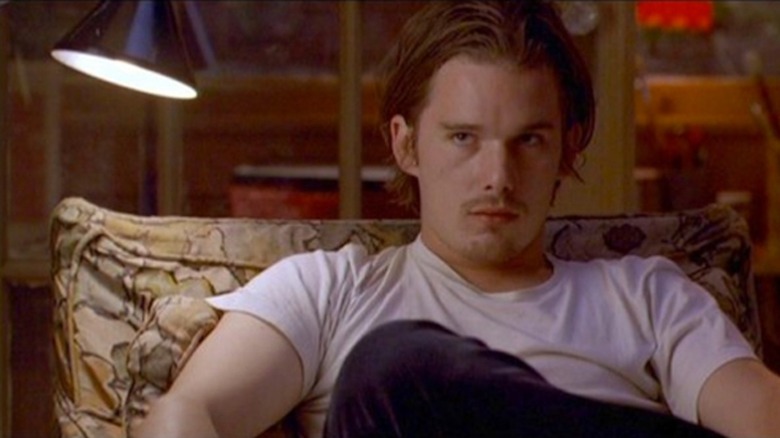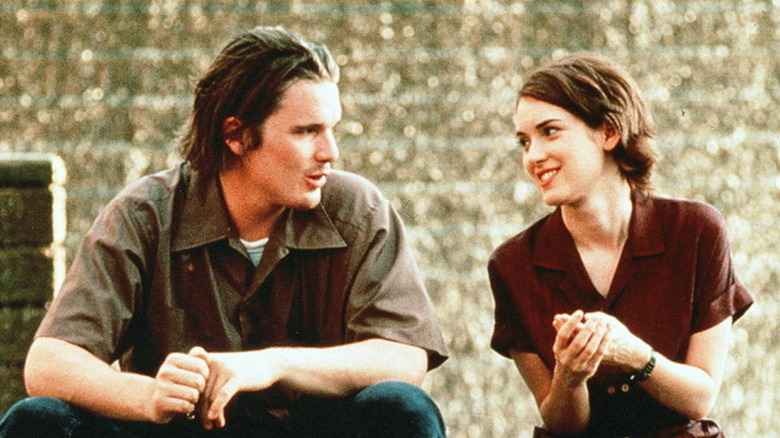Why Ethan Hawke Ended Up Loving A Major Role He Used To Resent
When Ben Stiller's "Reality Bites" hit theaters in February of 1994, the entirety of Generation X was informed, over and over, that this was the definitive comedy about our slacker lives. Sight unseen, I bought it. Winona Ryder was our Gen X queen thanks to her performances in such instant classics as "Beetlejuice," "Heathers," and "Bram Stoker's Dracula," while Ethan Hawke had become a hero to our angsty cohort after leading a classroom revolution at the end of "Dead Poets Society."
The film, which depicts the struggles of four college friends as they embark on their post-graduation lives, marked Stiller's feature directing debut, which was also exciting. His "The Ben Stiller Show" was one of the sharpest sketch comedy shows of the early 1990s, and he'd brought over some of its cast members (notably Janeane Garofalo and Andy Dick) to appear in the film. Before the film's release, some of us hoped Stiller would skewer our generation's affected ennui. We were moody little jerks for no good reason. Give us the hell we richly deserve. Stiller didn't go there because Helen Childress' screenplay was an ensemble dramedy in the James L. Brooks mold. Every single character is flawed in relatable ways — except, maybe, for Hawke's Troy.
I've always felt ambivalent about "Reality Bites" because I absolutely loathe Troy. He's a pretentious, selfish, browbeating bully, and I don't believe he redeems himself to the degree where he is worthy of Lelaina's love. Ryder's character makes her own dubious decisions (her romance with Stiller's TV producer Michael leads her to the brink of selling out), but Troy represents a type of slacker dude that was the bane of my existence in the '90s. Interestingly, Hawke didn't like Troy either, but eventually made his peace with the character.
Ethan Hawke didn't want to be the Gen X slacker dude archetype
In a recent interview with Rolling Stone, where Hawke broke down his career via 10 of his most interesting roles, he acknowledged that he knew the Troy type. "In the early 1990s, I saw real-life Troys everywhere," said Hawke. "The guy who walks around with the copy of 'Zen and the Art of Motorcycle Maintenance' in his back pocket all the time, who you kind of respect but also roll your eyes at? I knew that guy."
Hawke did, however, want to work with Ryder, whom he considered "the best actor in the world at that moment." Still, he needed further convincing from his future co-star. According to Hawke, Ryder told him, "'We don't have to have an opinion about whether we like them or not. Let's just play them truthfully.' Her saying that, plus the script just had gold in it — I mean, Helen Childress is a brilliant writer. So I said yes. And then everyone thought I was that a**hole for years!"
Hawke felt people couldn't separate him from the character, and he was concerned that this would leave him pigeonholed as an actor. As he told Rolling Stone:
"I went from being, y'know, just one of the poets in 'Dead Poets Society' to 'the face of Generation X.' Like, what? No! I was so afraid of that label, because it's like, 'Once this Gen X thing goes away, I will too.' I can't tell you how many times I read that after the film came out."
When Hawke attended a 25th anniversary screening of "Reality Bites," he realized Troy was emblematic of a Generation X type, and understood he'd given an iconic performance as a person he disliked. That's the job of an actor.

